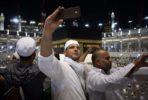KUALA LUMPUR — The protest by a group of Muslims in Selangor who called for a new church to remove a cross outside its premises has drawn a strong reaction from a broad coalition of moderate Muslims and politicians, exposing the rift between ultra and moderate Muslims and prompting the Cabinet to announce that the police will launch an investigation.
Malaysian society has become increasingly polarised along religious lines in the past few years. In particular, the growing politicisation of religion means that, going forward, one can expect pushback from the majority of Malays, who are moderate in orientation, analysts told TODAY.
In announcing the Cabinet’s decision yesterday, an under-pressure Prime Minister Najib Razak said the Sedition Act or other existing laws could be used against the protesters. “The protesters should have discussed with the church, instead of taking actions that have created worry and restlessness in this multiracial country,” he said.
“The people must abide by the country’s laws and practise respect of other religions, as enshrined in the Constitution. We also need to have an attitude of tolerance and mutual respect among communities of different religions,” Mr Najib added.
The protesters were roundly criticised since the incident, notably by a group of former Malay high-ranking civil servants, also known as the G25. “Firm action must be taken against the ignorant, intolerant Muslims who protested for the removal of a cross from a church,” said the G25 yesterday.
The moderate group added that the protesters’ actions were an embarrassment to Islam and proved that they were ignorant of the tenets of their own faith, which preached tolerance and respect for all religions.
The Muslims Professional Forum also denounced the protest, saying that this “mindless act of hatred and incitement against another religion’s place of worship has no place in Islam and deserves unreserved condemnation”.
Dr Ooi Kee Beng of the Institute of Southeast Asian Studies, noted that the protest was a “serious provocation”.
“Since race has slowly become ineffective as a way of polarising society to strengthen certain parties’ hold on power, it has over the last few years become the fashion to use religion as the means by which the division of Malaysian society can continue,” he told TODAY. “What this cynical process means is that an attack on the idea of cultural pluralism and tolerance has been sustained for several years … At some point, Malaysian society, especially the majority of Malays who believe pluralism is the basis of social peace in Malaysia, has to push back.”
On Sunday, about 50 people gathered outside the church to demand the removal of a cross affixed to the building. The protesters reportedly said the presence of a cross in the Muslim-majority area posed a challenge to the religion and could sway the faith of the youth.
The cross was taken down by church leaders a few hours later.
Yesterday’s Cabinet decision came after remarks by Home Minister Ahmad Zahid Hamidi on Monday that the protest was seditious and that the government would take action. Putrajaya updated and strengthened the Sedition Act this month to crack down on people inciting racial and religious disharmony.
Police chief Khalid Abu Bakar received a barrage of criticism from both sides of the political divide for his initial reluctance to launch a sedition probe, indicating that there was no element of sedition as the demonstration was not against Christianity.
From the opposition end, Democratic Action Party (DAP) secretary-general Lim Guan Eng yesterday said that failing to take any action against the protesters would “put an end to any talk of moderation at the international stage” by Mr Najib.
Mr Henry Benedict Asirvatham, Malaysian Indian Congress (MIC) liaison committee deputy chairman for Penang, yesterday said the incident had “put a black stain in our country’s multiracial and multi-religious image”. The MIC is a component party of the ruling Barisan Nasional.
“There is a worrying trend within the United Malays National Organisation (UMNO) ruling party to politicise religious issues,” said Dr Mohamed Nawab Mohamed Osman of the S Rajaratnam School of International Studies.
“UMNO is currently in a weak position and seeks to survive. There are elements within the party who will use racial and religious issues to position themselves. Some extremist political groups have been gaining traction in some segments of society because of how well the Chinese and Indians had effectively organised themselves during the last election. There is fear among the Malays that the Chinese will use the (opposition) Pakatan Rakyat to their benefit, even though there is no Chinese Prime Minister.”
Source:www.todayonline.com







